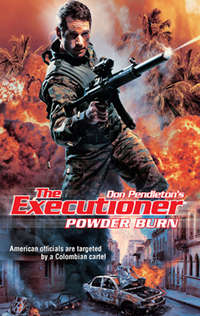
Powder Burn
“I want the gringo, Esteban,” he said. “Make it your top priority.”
“Sí, Jefe.”
“When you find the woman, he should be nearby. If not, she’ll know how to reach him. See to it that she tells you.”
“And if she resists, Naldo?”
“Subdue her. Use whatever force is necessary, but she must be fit for questioning.”
“I’ll speak to our doctor and have him standing by.”
“Good thinking.”
The doctor was a third-generation Nazi whose grandfather had avoided prosecution for war crimes by fleeing to South America, sampling the hospitality of Argentina’s Perón and Paraguay’s Stroessner before settling in Colombia under the Rojas regime. He had advised the army on interrogation methods, and supplied that same expertise to paying clients in the private sector.
Viva free enterprise!
“I won’t detain you any longer from the hunt,” Macario announced. “Keep me updated on your progress, eh?”
“Of course, Naldo.”
If Quintaro resented the dismissive tone, he didn’t let it show. Alone once more, Macario allowed his thoughts to focus on the stranger from America whose mission almost certainly involved Macario’s destruction or imprisonment.
To El Padrino, they were much the same. He was determined that he would not live inside a cage. And any man who sought to kill him would be utterly destroyed.
With any luck, by Macario’s own hand.
ASIDE FROM ITS CAPITAL District, surrounding Bogotá, Colombia was divided into thirty-two “departments,” the equivalent of states or provinces. The Department of Tolima was southwest of Bogotá, once the domain of mountain-dwelling Pijao tribesmen, now an agricultural state known for the production of coffee and coca. Twin branches of the Andes Mountains, the rugged Cordillera Central and Cordillera Oriental, provided much of the raw material that was refined into cocaine by outlaw labs.
In short, prime hunting territory for the Executioner.
Bolan and Pureza drove the eighty miles from Bogotá to Ibagué, Tolima’s capital city, over a two-lane mountain road resembling something from the wilds of Appalachia. Outside of Valle del Cauca in the far west, Colombia’s highway infrastructure remains primitive, with patchwork repairs the general standard.
Bolan had no trouble with the Pontiac G6 in transit, holding his speed near the 48 mph limit established by law and keeping an eye peeled for highway police. Pureza, navigating, took the opportunity to brief him on the Macario cartel’s operations in Tolima.
“Obviously, growing coca,” she explained, “but the refinement is conducted here, as well. First they produce basuco, like brown putty, which some peasants smoke. From that, with more work, comes the cocaine hydrochloride you would recognize, in powder form. If the wholesale customers want crack, they finish the procedure on their own, after delivery.”
“You have the labs spotted?” Bolan asked.
“Some, of course,” Pureza said. “We never find them all.”
“And those you do find?”
There was resignation in her shrug. “Some are destroyed. Others are warned to move. Some carry on as if the law did not exist. It all depends on the police commander. Regrettably, the standard of enforcement is inconsistent.”
“Same thing in the States,” Bolan admitted. “So what’s on our hit list today?”
“East of Ibagué, in Piedras Province, there’s a lab that I have been aware of for some time. Captain Celedón has been unable to locate it, even with the aid of satellite photographs. Perhaps we help him out today.”
“Sounds like a plan,” Bolan replied. “How is it for accessibility?”
“There is a road, of course, for transportation of the coca leaves and final product. We can use it to a point, but then must walk.”
“I’ve got my gear,” Bolan said. “Are you ready for a jungle hike?”
“I will be, when we’ve done some shopping in Ibagué.”
“Right. You mentioned satellite shots of the lab?”
“That’s correct.”
“Do they offer any insight on security arrangements?” Bolan asked.
“The plant has guards, of course,” Pureza replied. “In photos I have seen, there were at least a dozen men with rifles. Aside from them, cocineros—the cooks—supervise a peasant staff in preparation of the coca leaves. You know the five stages of refinement?”
Конец ознакомительного фрагмента.
Текст предоставлен ООО «ЛитРес».
Прочитайте эту книгу целиком, купив полную легальную версию на ЛитРес.
Безопасно оплатить книгу можно банковской картой Visa, MasterCard, Maestro, со счета мобильного телефона, с платежного терминала, в салоне МТС или Связной, через PayPal, WebMoney, Яндекс.Деньги, QIWI Кошелек, бонусными картами или другим удобным Вам способом.
Вы ознакомились с фрагментом книги.
Для бесплатного чтения открыта только часть текста.
Приобретайте полный текст книги у нашего партнера:
Всего 10 форматов